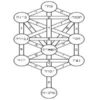Judaism doesn’t have any concept of hell, but the emanations in some schools of Kabbalism have a shadow aspect. The tree of life and its shadow. It’s called the tree of life because it is seen as an outgrowth of the infinite God, and the emanations arose in stages. It’s shadow element isn’t much talked about and is heavily debated, but the stories of the Kabbalist Sages all depict the Sage in the position of encountering some aspect of life, thus “Gods will”. Their prayer and ritual were actions to deal with the issue, and any hardship being seen as a test.
The adversary in Jewish belief is not given the power to torment humanity, it is just the intelligence that sees the dark side. It is the prosecuting attorney so to speak. The knower of your sins, and without atonement God hears the indictment of the adversary and acts accordingly. The word Messiah, or in the Hebrew Moshiach, was the arising of an advocate. An intelligence that would argue for the atonement of all creation, but the concept of the adversary being cast out is not supported in the Torah.
As in a Judge of the Pharisees? Yes. Those cast out more likely refers to the Canaanites who were a different Semitic tribe, and many other factions date back to the same era including the Yezidi people. The tree of life as it’s reflected in the world of light as they call it, and its shadow, are both seen equally as manifestations of Gods will. Testing isn’t so much some mind game of Gods, as it is an opportunity for choice. Crisis and opportunity are seen as the same in a lot of mystical schools of thought, even Catholic mysticism. The term “dark night of the soul” was coined by a Catholic mystic.
The non mystic branches of religion appear to be the ones who wanted control of the people. So they split off? Looking at world history it seems the mystical practices were the predecessors of every orthodox school. In a sense, the understanding of a Kabbalist is like a codified Taoist. They both see an infinite, and that we can move more in harmony with it.
It is interesting how the surrendering of control makes people want to discredit religions that don’t need to control. That is interesting, yes.
The Kabbalist teachings also from my experience seem to explain elements of the Yezidi cannon, who revere Malek Taus or the peacock angel, and this concept seems to connect both to Semitic and Persian beliefs. The idea that there was a counterpart to the divine God, and a falling out between the infinite God and the limited God. But to the Yezidis they reconciled, and to the now extinct Magi there would be no reconciliation without war, and people would have to choose sides. An idea that wasn’t and isn’t present in Judaism, nor was it in early Christianity. As a matter of fact, the name Ahriman of Persian origin, translates into a very familiar meaning in English. Father of Lies.
Choosing sides is a form of control as well? Ah, yes. Later with the movement lead by Zoroaster, his teachings forbade the view of Ahriman as a legitimate power at all. Zoroaster often being shown as carrying a flame at heart level. An image now shown in the depiction of Jesus in Catholicism. An interesting side note perhaps, there is a branch of Judaism that does see Jesus as having been the Messiah, but they are and still see themselves as Jewish, and still have very Jewish practices. Arguably the rapture Christians speak of could be a period of rapid Kabbalistic ascension.
Your thoughts are welcome. Be well friends.
Travis Saunders
Dragon Intuitive
~science,mysticism,spirituality~



Leave a Reply